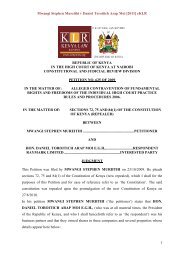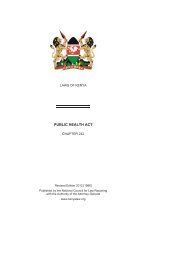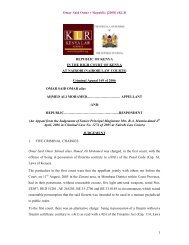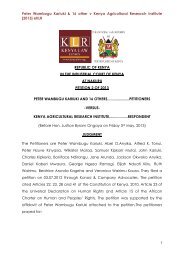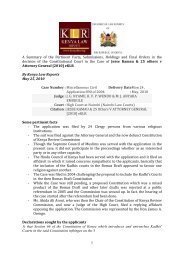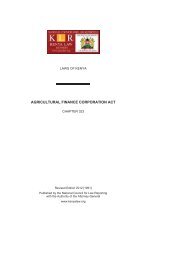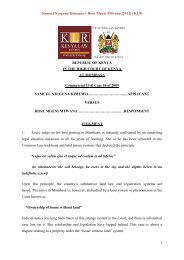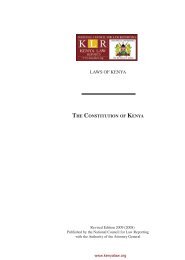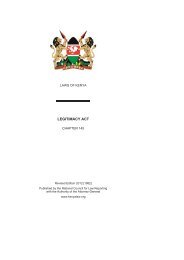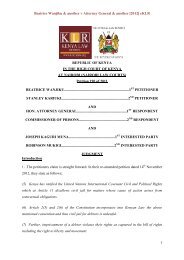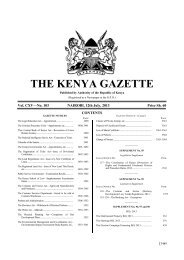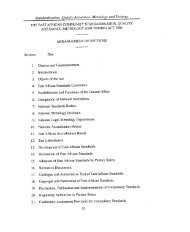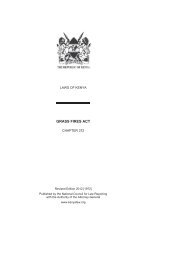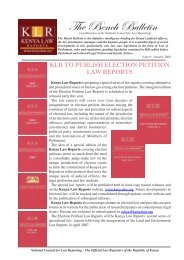Download Case - Kenya Law Reports
Download Case - Kenya Law Reports
Download Case - Kenya Law Reports
Create successful ePaper yourself
Turn your PDF publications into a flip-book with our unique Google optimized e-Paper software.
Securicor Courier (K.) Ltd v Benson David Onyango & another [2008]eKLR<br />
In our jurisdiction however, such contracts are purely governed by the common law.<br />
It seems that the current law governing the exemption clauses is as expressed by the House of<br />
Lords in Photo Production Ltd. (supra) and in George Mitchell (Chesterhall) Ltd. (supra).<br />
The House of Lords has however, held that a limitation clause was not subject to the<br />
very strict principles of construction applicable to clauses of complete exclusion of liability<br />
or of indemnity (see Ailsa Craig Fishing Co. Ltd. vs. Malvern Fishing Co. Ltd. [1983] 1 All<br />
E.R. 101 which was applied in George Mitchell (Chesterhall) Ltd. vs. Finney Lock Seeds<br />
Ltd. (supra).<br />
www.kenyalaw.org<br />
In Ailsa Craig, Lord Wilberforce said in part at page 102 -103 j:<br />
“Whether a condition limiting liability is effective or not is a question of<br />
construction of that condition in the context of the contract as a whole. If it<br />
is to exclude liability for negligence, it must be most clearly stated and<br />
unambiguously expressed, and, in such a contract as this, must be<br />
construed contra proferentem. …… Clauses of limitation are not regarded<br />
by the courts with the same hostility as clauses of exclusion; this is because<br />
they must be related to other contractual terms, in particular to the risks to<br />
which the defending party may be exposed, the remuneration which he<br />
receives and possibly also the opportunity of the other to insure”.<br />
In the same case, Lord Fraser of Tullybelton said at page 105 h – j:<br />
“There are later authorities which lay down very strict principles to be<br />
applied when considering the effect of clauses of exclusion or of indemnity.<br />
…………………………….<br />
………………………………………………………………………………….<br />
In my opinion, these principles are not applicable in their full rigour when<br />
considering the effect of conditions merely limiting liability. Such<br />
limitations will of course be read contra proferentem and must be clearly<br />
expressed, but there is no reason why they should be judged by the specially<br />
exacting standards which are applied to exclusion and indemnity clauses.<br />
The reason for imposing such standards on these conditions is the inherent<br />
improbability that the other party to a contract including such a condition<br />
intended to release the proferens from liability that would otherwise fall on<br />
him. But there is no such high degree of improbability that he would agree<br />
to a limitation of the liability of the proferens, especially when ……… the<br />
potential losses that might be caused by the negligence of the proferens or<br />
8



